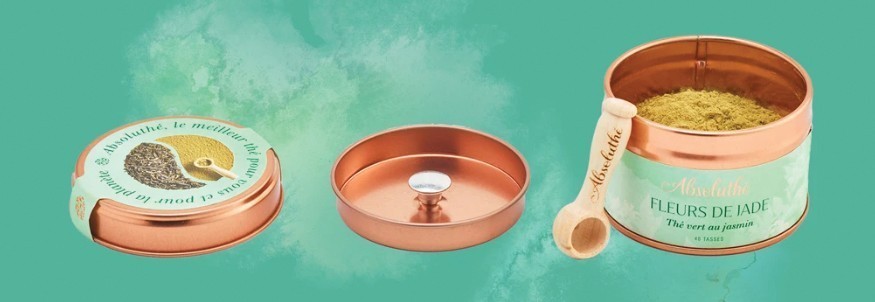
"Zero waste" (or ZW for its adepts) is an international consumer movement seeking a maximum reduction in household waste, by encouraging use of bulk buying, composting, and reuse (instead of single use). By advocating a different way of consuming, this movement is the answer to an ever stronger environmental awareness among consumers. And indeed, 84% of French people consider that reducing single use plastic packaging has become a priority (OpinionWay survey from June 2020).
Starting with a retail offer of bulk goods, which has grown by 50% in France between 2013 and 2019 according to the trade magazine LSA, "zero waste" is behind a multi-pronged initiative adopted by certain brands. One among these brands is the start-up Aboluthé. Improving consumer practices around tea, from how the ingredients are sourced to how it is consumed, is the ambition of Camille and David, the two co-founders.
a sustainable cuppa?
It was during a trip to Vancouver that Camille Douay, a lifelong supporter of ecology and wellness, discovered the Zero Waste movement. In 2017, on returning to France, and inspired by a student project, she founded her micro-enterprise, Aboluthé. "Tea is the most widely consumed beverage in the world, so it's about time for us to find an approach that brings together organic farming, sustainable sourcing and zero waste," she explains.
"Why tea?" you may ask. Isn't tea a pretty sustainable product already, provided there are no plastic sachets, if you buy loose leaf, or even powdered versions. "It's true that powdered teas already exist," confirms David Snadoudj, who joined Camille at Aboluthé in 2019. "But they are mostly made up of sugar and other regrettable ingredients, so it's rarely "real" tea. With Absoluthé, we wanted to offer a powdered tea that is 100% organic, based on the idea of matcha tea, to which you only need to add water."
By micronising the tea, meaning grinding it to an extremely fine powder, Camille and David developed a drink with the following advantages:
- Less product is used - so fewer resources: "We use on average 6 times less product for an equivalent taste," David explains.
- Less packaging (teabags and sachets) and no waste (leftover leaves): "In France, about 15,000 tonnes of tea are thrown out each year, without counting the packaging which is mostly plastic and single use."
- It can be used in hot or cold water, for instant ice tea.
- It can be used as an ingredient in cooking, just like matcha tea.
"All in all, you get a more sustainable drink, that uses less product and creates less waste." But Camille and David have not lost sight of the other interests of tea drinkers: taste, ease of use and health. "Our drink is also more easy to use as it is ready in an instant without problems of varying strength and infusing time. It's also a more healthy drink as this allows drinkers to better access the health benefits of tea, in particular the antioxidants."
industrial production, coming soon to France
Founded in 2017, Aboluthé started its activites in the summer of 2018, as a micro-enterprise. Having incorporated in 2020, Camille and David are currently scaling up their production.
"Up till now, we were using a university laboratory, and everything was small scale. We recently invested in our own production facilities, buying machines and hiring a food technology engineer to help us launch our production and sales," says David. "We are currently testing the machine, but that doesn't stop us producing," he explains.
And while they are both from Paris, they are choosing to install their production site in the Haute-Marne department, one hour from Dijon where ToasterLAB is based. David explains: "To start with, the financial aspect pretty compelling. Rents are much lower outside of the Paris region. We are also finding that the local business ecosystem is very welcoming and dynamic."
hold onto your beliefs as you grow
"Consumers are now better educated about their purchases, and want products that are organic, respectful of the environment, but also great tasting. We have noticed that the market is still out of step with these expectations, and we hope to contribute to realigning things."
Neither Camille, who has a degree in urban planning and another in environmental planning for businesses, nor David, who previously worked in insurance, have a background in the food industry. But they are both anti-waste and environmental protection advocates in their private lives, and are convinced that they can change how tea drinkers consume their product.
"The codes of the food industry are pretty conservative. To shake things up, we needed to have a guide and the ToasterLAB program provided us with that."
To acheive their ambitions, Camille and David are counting on their sincere beliefs. "We have specific goals in order to realise our vision. We buy 100% organic plants and we are hoping to source as locally as possible. We are watching very closely any tea production in Europe or in France, even if it's just starting out. Our other suppliers are as local as possible - or at least French or European. We also refuse to use additives. And we are working with retail channels that share our values."
"It's with all these small steps that we can make a difference."
getting access to a specialised network with ToasterLAB
By joining the "lockdown" cohort of ToasterLAB, David and Camille carried out much of their acceleration virtually. They are especially pleased with the contacts they have made in the food industry - "this was what was missing for us, and only a specialised program like ToasterLAB could have provided this."
And their next steps? They will be extending their range of black and white teas, and funding their growth with a fundraising round in the near future.
For any more information about the ToasterLAB acceleration program, contact me: clement.galbois@vitagora.com.
By Clément

Business Developer and "start-up back-up" as he likes to call himself, Clément was immersed in world of start-ups before joining the ToasterLAB team. A keen volonteer for a number of evironmental causes that he holds dear, Clément is the main point of contact for ToasterLAB's start-ups. Contact him: : clement.galbois@vitagora.com.

